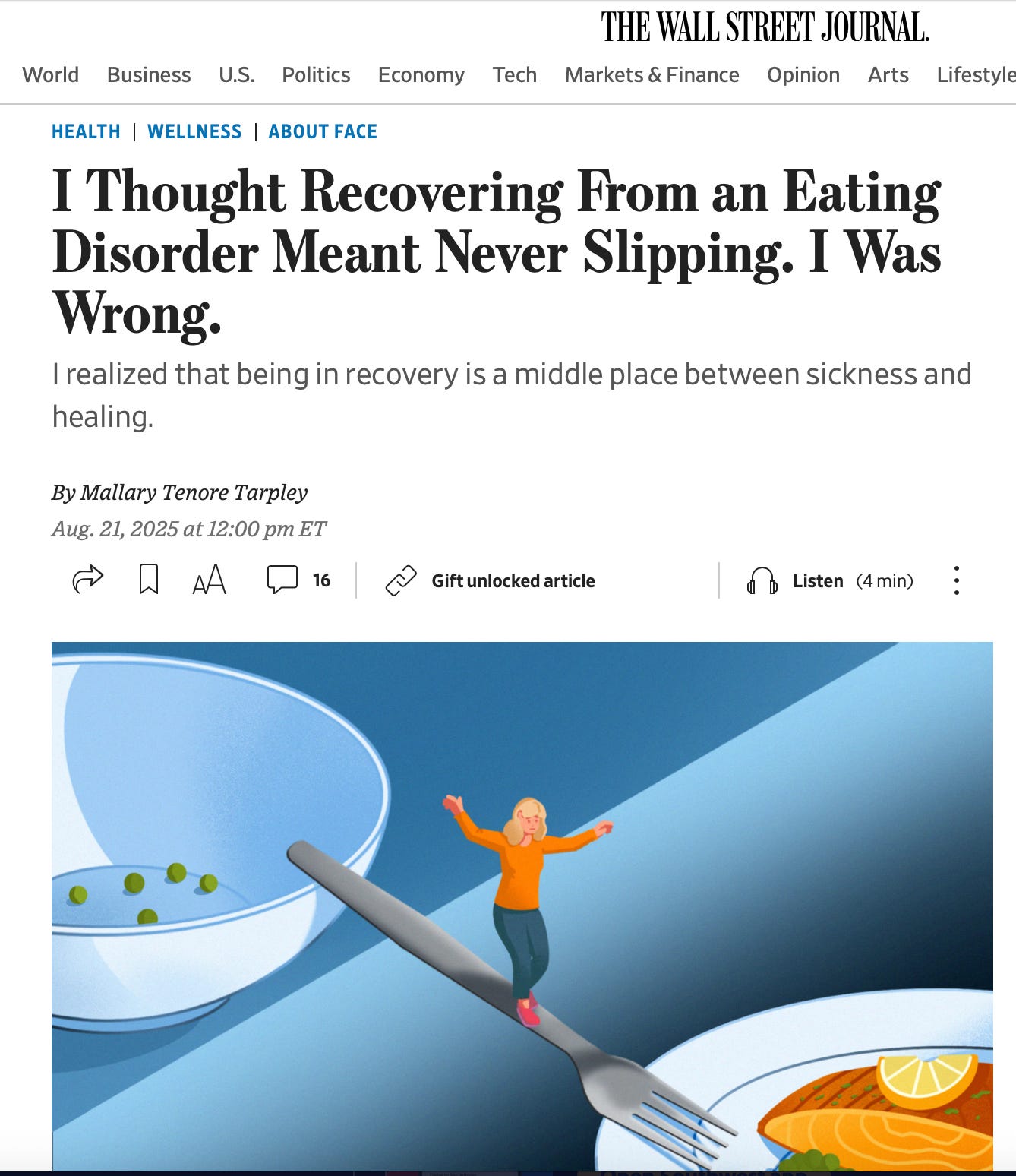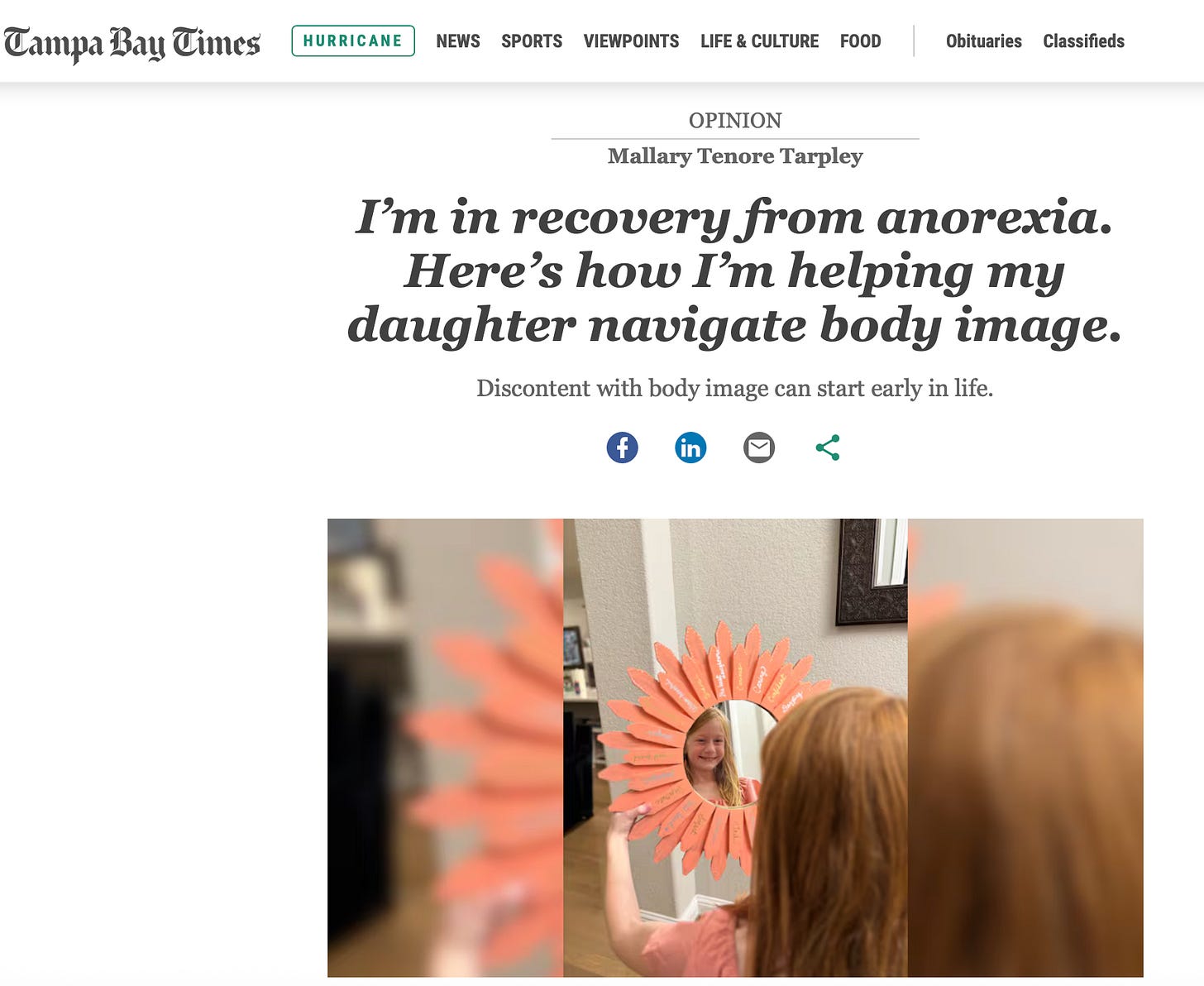10 questions to help spark personal essay ideas
A guide for helping you think through ideas.
I’ve written a lot of personal essays lately and have been thinking about the driving questions behind them. Most of the essays stemmed from a desire to draw upon my lived experience to create awareness, dispel misconceptions, and/or validate others’ experiences.
With that in mind, I’ve taken 10 of my personal essays and shared the driving questions behind them. My hope is that you can contemplate these questions and use them as inspiration for your own writing.
1.) Why is no one talking about _______?
This was the driving question behind the essay, “We need to talk with kids about GLP-1 — before it’s too late,” published in USA Today earlier this week.
The idea for this essay originated after I was watching “Home Alone” with my kids a few months ago and saw ads for GLP-1s throughout the movie. I wondered, Have we really gotten to the point where need to be showing GLP-1 ads in the middle of a kids movie on Disney+? And why aren’t more people talking about the potentially harmful side effects of these ads?
I reflected on this as a woman in eating disorder recovery and as a mother who wants to teach my children to identify diet culture so they can call it out rather than internalizing it. Anytime you ask yourself, “Why is no one talking about ___?” it’s a good indication that maybe you need to talk about it in an essay.
2.) What do people get wrong about _______?
“We need to eliminate the term ‘Freshman 15,’” published in TIME Magazine earlier this month.
I thought about this question a lot when exploring common misconceptions about eating disorders in my book SLIP. I also considered it when reading research, with an eye toward studies that debunked commonly-held beliefs. At one point, I read a body of studies debunking the “Freshman 15,” which refers to the supposed number of pounds that students gain during their freshman year of college.
I had long considered this to be a pernicious term, and I wrote about it briefly in my book. I wasn’t able to delve into it deeply, though, so I made a note to return to it for a personal essay. (Outtakes documents are helpful for such purposes.) I knew it would be a good back-to-school piece, so I saved the pitch for summertime, with hopes that it would run in August or September.
If you can challenge a commonly-held belief and back it up with evidence, you should consider writing about it. Such pieces help to dispel myths and broaden people’s scope of understanding.
3.) What did I once believe but no longer do?
“I thought recovering from an eating disorder meant never slipping. I was wrong,” published in The Wall Street Journal in August.
This question is a great writing prompt that can lead to worthwhile story ideas.
It’s difficult to change our beliefs and perspectives, so when we do, it’s worth considering how and why. My Wall Street Journal essay was inspired by a shift in perspective that I explored in my book: the fact that I used to think slips were signs of failure, whereas now I see as them as opportunities for growth.
The essay sparked more reader emails than any other piece I’ve written, and it was a reminder that people appreciate honest and vulnerable narratives about the experiences that shape our perspectives.
4.) How am I learning to _______?
“How I’m learning to outlive my mother,” published by Katie Couric Media in July.
This piece came out a couple of months after I turned 40, which is the same age my mother was when she passed away. I knew this would be a momentous occasion, and I wanted to write about what I was learning from the experience.
It can be helpful to reflect on what we’re learning, especially during transitional moments that other people can relate to. Rather than approach lessons in a prescriptive way, with literal lessons learned, try to illustrate them through moments or memories that represent growth or a newfound understanding.
5.) Is there something I can create to illustrate a message I’m trying to convey?
“I’m in recovery from anorexia. Here’s how I’m helping my daughter navigate body image,” published in the Tampa Bay Times in March.
Earlier this year, I felt compelled to write about the ways I’m helping my children navigate body image. I also found myself wanting to create something that would help me do this — partly because I thought my kids would absorb my lessons better if I tied them to something tangible, and because I like writing essays inspired by objects (photos, mementos, journals, etc.)
My daughter’s 9th birthday was approaching, so I decided to buy her a wooden mirror in the shape of a flower. On each petal, I wrote words that come to mind when I think of her: creative, kind, empathetic, loving, smart, strong, etc. I gave her the mirror as a birthday present and told her that I hoped she would look in it and see not just what she looks like but who she is as a person.
The mirror opened up avenues for talking about body image with both my daughter and son, and it ended up being a focal point of my essay. (I’ve written before about how objects can be great sources of inspiration for storytelling.)
6.) What wording/messaging may seem innocuous but isn’t?
“Run the Turkey Trot, but don’t fall for diet culture,” published in The Dallas Morning News last Thanksgiving.
There are messages we grow up hearing all our lives, and at a certain point we may begin to question whether they’re more harmful than helpful. This was the case for me, as I began considering the ways in which advertisements for Turkey Trot races were often rooted in diet culture (a la “run a Turkey Trot to earn your Thanksgiving dinner!”)
I was negatively affected by this diet-culture talk in my early adulthood. But as I got older, I felt more confident calling it out. In the essay, I talk about the negative effects of such messaging — not in a “I can’t believe anyone would say this!” kind of way but rather in a “here’s how this messaging can be harmful and here’s why you should reconsider using it.” The goal isn’t to be accusatory; it’s to introduce people to new ideas they may have never considered.
7.) How do I measure small victories in recovery, my work, my relationships, etc.?
“Celebrating small victories (and self-love) with origami,” published in the Los Angeles Times in 2023.
A lot of personal essays tend to focus on challenges that people have faced. Challenges are important, but so are the small victories that we encounter along the way. Often, these small wins lead to personal growth and can help show others a way forward.
A few years ago, I started making origami hearts whenever I made a choice in service of recovery. I had mason jars full of these hearts — a visual reminder of the progress I continue to make each day. After the essay was published, I heard from several readers who said they liked the piece’s overarching message: Focus on wins rather than fixating on weaknesses.
8.) Have I recently experienced something unsettling that others could learn from?
“Healthy eating curricula may contribute to eating disorders in kids,” published in The Washington Post in 2023.
When my children were 5 and 7, one of their summer camp activities left me feeling unsettled. My kids had been instructed to categorize foods as “healthy/good” and “unhealthy/bad,” and it reminded me of similar exercises I had to do in health class in the late 1990s. (The health class was one of the factors that ultimately contributed to my childhood eating disorder.)
As I explain in the essay, I was upset by the exercise and decided to use it as a springboard for reporting on the ways that healthy eating curricula can contribute to eating disorders in kids. I bookended the piece with personal narrative and wove reporting in throughout.
If something rubs you the wrong way — and it relates to an under-discussed or misunderstood topic — consider how you could advance the narrative through a personal essay.
9.) Is there a meaningful anniversary I could write about?
“From losing a mother to motherhood: Grief and gratitude mix in anniversary month,” The Dallas Morning News, 2022.
For the first few years after my daughter was born, I kept thinking about the fact that her birthday is just three days before the anniversary of my mother’s death. It took me some time to figure out what I wanted to say about this, but I knew I’d want to write about it. I finally did, right before my daughter’s 6th birthday and the 25th anniversary of my mother’s death.
The essay was about the coexistence of life and death, love and loss. In this case, universal themes drove my thinking around the essay and ended up helping me write about a very personal anniversary in a universally relatable way.
10.) When have I slipped, and how might writing about this slip help others?
“When I lost my sense of taste to COVID, anorexia stepped in,” published in The New York Times in 2021.
This essay marks the first time that I publicly wrote about slipping as a mother in eating disorder recovery, and the result was powerful. The feedback I got from readers helped crystalize my thinking around the focus of my book SLIP.
Specifically, it made me realize that people were craving candid narratives about the unexpected slips that can happen in eating disorder recovery — and about the messy, imperfect nature of healing. I could tell the piece had resonated with many, and I found myself wanting to help more readers in the form of a book.
If you have a tendency to gloss over slips, challenge yourself to write about one. Try writing an entire journal entry about it in a zoomed-in, detailed way that shows how you slipped and how you got back up again. See what emotions arise and then ask yourself if you’d feel comfortable sharing the slip publicly in an essay. If you do, great. And if not, that’s ok too. Personal essay writing is always an exercise in figuring out what you still want to conceal — and what you’re ready to reveal.
Over the next month, I plan to share other tips on pitching personal essays and articles. If you have related questions that you’d like me to address, please share them in the comments!
I hope you’ll join me on the second leg of my SLIP tour, featuring virtual and in-person events between now and the end of the years. Also, if you haven’t yet purchased SLIP, I hope you’ll consider doing so. It’s available wherever you buy books.




I love these prompts, and the examples of how you used each of them! Thanks for sharing!
Thank you so much, I always enjoy a good list of nonfiction prompts!